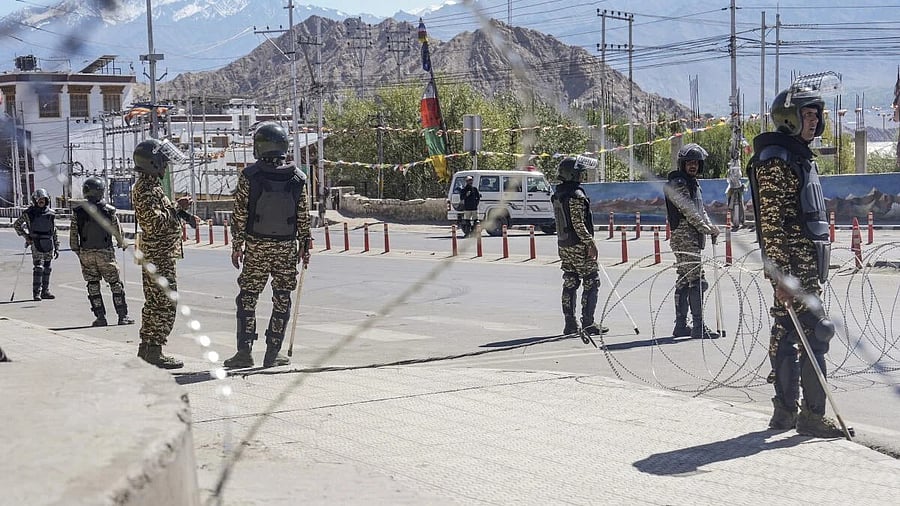
Security personnel stand guard on a road amid curfew, days after violence during protests for Ladakh statehood, in Leh.
Credit: PTI Photo
Srinagar: As life gradually returns to normal in Leh after a week of curfew, the Ladakh administration has ordered a magisterial inquiry into the killing of four civilians during violent protests on September 24 over the demand for statehood and constitutional safeguards under the Sixth Schedule of the Constitution.
IAS officer Mukul Beniwal, Sub-Divisional Magistrate (SDM) Nubra, has been appointed inquiry officer and asked to submit a comprehensive report within four weeks. The probe will establish the facts and circumstances that led to the serious law and order situation, the police action, and the resultant fatalities.
According to a notification, people with knowledge of the incident can record their statements between October 4 and 18 at the Conference Hall of the Deputy Commissioner’s Office in Leh.
“Any person(s) having information about the incident or willing to provide oral evidence, written statements, or material evidence (such as photographs or video recordings) may appear before the undersigned and submit their statements/evidence,” the notice reads.
Meanwhile, the police and intelligence agencies are probing the role of social media in mobilising the protests. Sources said several accounts and mobile numbers that had been inactive for a long time suddenly became active on the night of September 23, issuing calls that drew crowds from different parts of Leh. These accounts allegedly helped coordinate the mobilisation that culminated in violence and arson the next day and are now under close watch.
Two days after the killings, police arrested climate activist Sonam Wangchuk under the National Security Act, accusing him of having “foreign links” and of being a key instigator of the violence. Police claimed that video footage of his earlier protests had been shared across the border by a recently arrested Pakistani intelligence operative.
Wangchuk, a globally recognised figure for his environmental activism, had emerged as one of the leading voices of the Ladakh statehood movement. His arrest triggered anger across the region, with supporters insisting he was being targeted for peaceful dissent.
The arrest also led the Leh Apex Body (LAB) and the Kargil Democratic Alliance (KDA) umbrella groups representing Leh and Kargil to announce their withdrawal from the October 6 talks scheduled with the Union Home Ministry in New Delhi. The two bodies accused the Centre of criminalising a democratic agitation and reneging on earlier assurances about constitutional safeguards for Ladakh.
This marks a serious setback to dialogue, as both groups had been holding periodic discussions with the Centre since 2021. Since Ladakh was carved out of Jammu and Kashmir and made a Union Territory in August 2019, political groups, student bodies, and religious organisations have rallied for full-fledged statehood and inclusion under the Sixth Schedule to protect land rights, jobs, and the cultural identity of Ladakh’s predominantly tribal population.
The LAB and KDA, historically divided along regional lines, joined hands after 2021, presenting a rare united front. Their campaign has included rallies, strikes, and hunger protests many led by Wangchuk himself, which drew national and international attention.
The September 24 protests, which turned violent after police opened fire on demonstrators, have become a turning point in the agitation. Four civilians were killed, dozens were injured, and government property was damaged in the clashes. The administration imposed curfew across Leh and suspended internet services for days to prevent escalation.